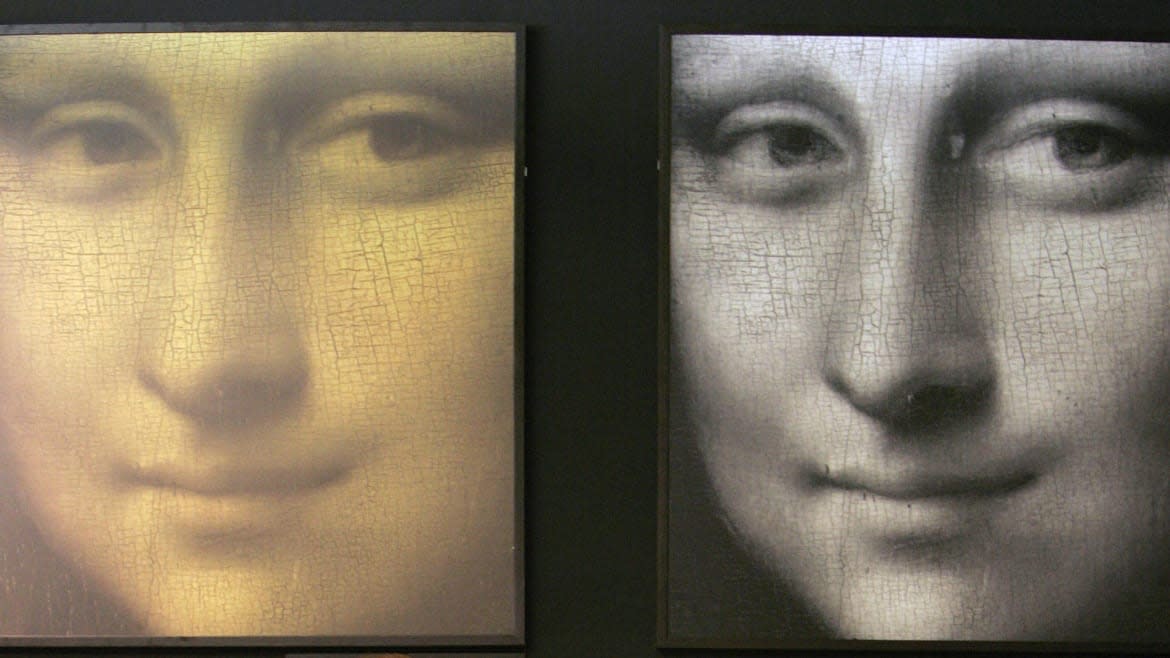Leonardo da Vinci’s Mother Was an Enslaved Russian Who Was Freed by His Father

- Oops!Something went wrong.Please try again later.
Leonardo da Vinci’s mother was stolen from present-day Russia and enslaved, according to new research that will upend Italy’s understanding of its most famous artist.
In another extraordinary twist, Italian historian Carlo Vecce has claimed that she was freed from slavery by da Vinci’s father, who was himself a well-known trader of enslaved people.
The humble origins of the mother of the great renaissance artist have long been contested by scholars and art historians.
In the centuries since his death, a general consensus formed around a narrative in which his mother, known only as Caterina, was a poor—and, crucially, Italian—peasant girl from the town of Vinci, from which Leonardo drew his name, made pregnant out of wedlock by da Vinci’s father, a wealthy notary, Ser Piero.
What is not contested is that Piero took custody of the child as a baby, rearing him in a rarefied Florentine home filled with ancient texts and artworks, and subsequently securing him an apprenticeship at the age of 14 with one of Florence’s most influential painters, Andrea del Verrochio.
Caterina has been notable by her absence from accounts of Leonardo’s life. The painter himself recorded only two incidents from his childhood: one in which a bird of prey hovered over his cradle, its feathers brushing his face, and another in which he discovered a terrifying cave while exploring a mountainous hillside.
There has long been speculation that he did not seek to advertise his mother’s humble origins.
Now, new research has emerged to back up persistent claims that Caterina was in fact enslaved, trafficked to Italy from the north Caucasus, the area east of the Black Sea, from the region of Circassia, which is now in southern Russia.
Vecce, the Italian historian, claims to have discovered a document in Florentine archives granting a teenage Caterina freedom from slavery.
According to a report in The Daily Telegraph, Vecce, a professor at the University of Naples L’Orientale, believes she was kidnapped from Circassia and trafficked via Constantinople to Venice before being bought by a family in the town of Vinci, near Florence, and put to work as a wet nurse, suggesting she had already been pregnant before she was made pregnant again by Ser Piero in the summer of 1451. Leonardo’s birthday is usually given as April 15, 1452.
The newly discovered document shows that Caterina was officially freed from slavery seven months later, in November 1452.
The certificate, written in Latin, refers to Caterina as being “a slave” from “Circassia”—and that it was signed by Ser Piero in his role as notary.
“The notary who freed Caterina was the same person who loved her when she was still a slave and with whom he had this child,” Vecce told a press conference in Florence as he launched his new novel, Il Sorriso di Caterina, which translates as Caterina’s Smile.
He added: “Leonardo was the son of a notary but he was only half-Italian, his mother a foreigner and a slave, a woman on the lowest rung of the ladder at the time.”
In an interview with NBC, Vecce said: “I never gave much credit to the theory that she was a slave from abroad. So I spent months trying to prove that the Caterina in that notary act was not Leonardo’s mother, but in the end all the documents I found went into that direction, and I surrendered to the evidence.
“At the time many slaves were named Caterina, but this was the only liberation act of a slave named Caterina [that] Ser Piero wrote in all his long career... Moreover, the document is full of small mistakes and oversights, a sign that perhaps he was nervous when he drafted it, because getting someone else’s slave pregnant was a crime.”
Martin Kemp, an emeritus professor of art history at Oxford University who has previously concluded Caterina was Caterina di Meo Lippi, an Italian orphan who lived in a farmhouse about a mile from Vinci, poured cold water on the new claims, however.
“Carlo Vecce is a fine scholar,” Kemp told NBC. “His ‘fictionalized’ account needs the sensation of a slave mother... I still favor our ‘rural’ mother, who is a better fit... but an unremarkable story does not match the popular need for a sensational story in tune with the current obsession with slavery.”
Get the Daily Beast's biggest scoops and scandals delivered right to your inbox. Sign up now.
Stay informed and gain unlimited access to the Daily Beast's unmatched reporting. Subscribe now.

